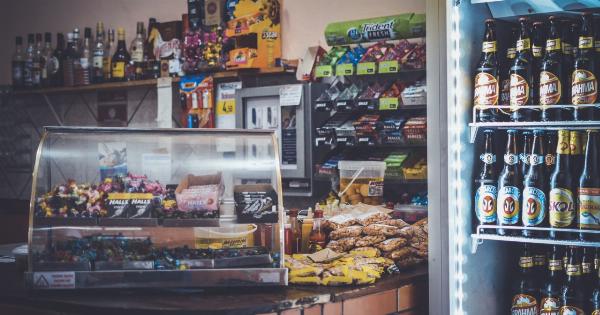Eating a balanced diet and maintaining a healthy lifestyle are vital for overall well-being and keeping up with the demands of our daily lives.
However, certain foods and beverages can have a draining effect on our energy levels, leaving us feeling sluggish and fatigued. In this article, we will explore some energy-sucking foods and drinks that you might be consuming without even realizing their impact. By avoiding or moderating the consumption of these items, you can ensure sustained energy throughout the day.
The Caffeine Trap
Caffeine is a renowned stimulant that many people rely on to kick-start their mornings or stay awake during long days.
While small amounts of caffeine can boost alertness and productivity, excessive consumption can lead to energy crashes and disrupted sleep patterns. Common sources of caffeine include coffee, tea, energy drinks, and certain sodas. It is advisable to limit caffeine intake, particularly in the late afternoon and evening, to prevent its interference with your sleep and energy levels.
Refined Sugars: An Instant Boost, a Subsequent Drop
Indulging in sugary treats such as candies, pastries, and sodas may seem like a quick energy fix, but the high sugar content can actually result in an energy rollercoaster. Initially, your blood sugar levels soar, leading to a burst of energy.
However, this is short-lived, as the subsequent sharp drop in blood sugar can cause fatigue and a decrease in alertness. Opt for healthier alternatives like fresh fruits or foods with natural sugars, as they provide a slow, steady release of energy rather than sudden spikes and crashes.
Heavy, Fat-laden Meals
Consuming heavy meals high in unhealthy fats can be a major drain on your energy levels. Fatty foods require more energy and time to digest, diverting resources away from other bodily functions.
Additionally, these meals can leave you feeling lethargic and sleepy, often referred to as the “food coma” effect. To combat this, incorporate lighter, nutrient-rich options into your diet, such as lean proteins, whole grains, and plenty of fruits and vegetables.
Processed Foods and Hidden Culprits
Processed foods often contain high levels of refined sugars, unhealthy fats, and artificial additives. These ingredients can destabilize your blood sugar, leading to fatigue and low energy.
Additionally, many processed foods lack essential vitamins, minerals, and fiber, which are necessary for maintaining optimal energy levels. It is advisable to read labels carefully and opt for whole, unprocessed foods whenever possible.
Alcohol: A Double-Edged Sword
While alcohol may initially have a sedative effect, it can disrupt your natural sleep patterns and hormone production, ultimately leaving you feeling tired and drained.
Additionally, alcohol is diuretic, often leading to dehydration, which can further exacerbate fatigue. Moderation is key when it comes to alcohol consumption, and it is essential to stay well-hydrated and allow sufficient time for rest and recovery.
Energy Drinks: A Misleading Boost
Energy drinks, which are often marketed as a quick fix for fatigue, can actually do more harm than good.
While the high caffeine and sugar content may provide a temporary energy spike, the subsequent crash can be severe, leaving you feeling more exhausted than before. Furthermore, excessive consumption of energy drinks can lead to dehydration and disrupt your sleep patterns. Opt for natural energy boosters like green tea or a well-balanced diet instead.
Imbalance in Micronutrients
Deficiencies in essential vitamins and minerals can significantly impact your energy levels. For instance, iron deficiency, commonly seen in individuals with anemia, can cause fatigue and weakness.
Similarly, inadequate intake of B vitamins, particularly vitamin B12, can lead to low energy levels. To prevent such deficiencies, incorporate a variety of nutrient-rich foods into your diet, or consider consulting with a healthcare professional to address any potential deficiencies.
Insufficient Hydration
Dehydration is a common cause of low energy and fatigue. Even mild dehydration can lead to decreased cognitive function and overall sluggishness. It is crucial to drink an adequate amount of water throughout the day to maintain optimal hydration levels.
While other beverages can contribute to your daily fluid intake, be mindful of their caffeine or sugar content, as they may counteract the hydrating effects.
Skipping Meals and Restrictive Diets
Skipping meals, particularly breakfast, can leave you devoid of essential nutrients and energy. Your body needs a steady supply of fuel to function optimally, and regular meals help maintain stable blood sugar levels.
Additionally, following overly restrictive diets that eliminate major food groups can lead to nutrient deficiencies and decreased energy levels. Strive for a well-balanced diet that includes carbohydrates, proteins, healthy fats, and a variety of fruits and vegetables.
Slow-digesting, Fiber-rich Foods
While fiber is essential for digestive health and maintaining regular bowel movements, foods high in fiber can take longer to digest. This slowed digestion can result in a feeling of heaviness and reduced energy levels.
It is important to strike a balance between consuming fiber-rich foods and faster-digesting options to ensure sustained energy throughout the day.
In summary
Being mindful of the foods and beverages we consume is crucial for maintaining optimal energy levels. While occasional indulgences are perfectly fine, it is important to be aware of the potential energy-sucking effects of certain items.
Prioritizing a well-balanced diet, staying hydrated, and adopting healthy lifestyle habits can help ensure sustained energy and vitality.






























